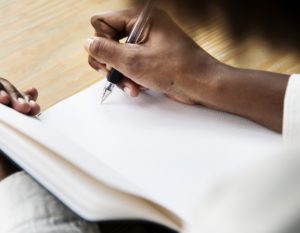Note-taking in lectures – what’s the point?
During a recent workshop on effective revision techniques, a group of students and I had an interesting discussion around the value of taking notes in lectures. We were talking primarily in the context of my first-year linear algebra course, which operates in a flipped-classroom, active learning style.
Having explored some research on the subject, I learned that taking notes in a lecture can fulfill two related purposes: the external storage of information, and the encoding of information.
Note-taking for external storage
External storage of information refers to the act of note-taking as the creation of material which represents what happened in the lecture, and that you can return to and review. In our context, this purpose of note-taking is completely redundant. This is because there are almost certainly other materials which represent to a greater or lesser extent what happened in the lecture (a lecture recording, slides or lecture notes). For my classes, these are the following: recording of the lecture (what is projected on screen plus my voice), scanned uploads of what I wrote during the lecture (I use the document camera), plus the peer instruction questions I asked (via the electronic voting system TopHat). So I see no reason at all for a student to create their own external storage. The exception to this would be in the case where you want to store a reminder of your own thinking. I’m imagining a situation where the lecturer said or wrote something that triggered an ‘ah-ha’ moment, but it wasn’t directly related to point in question.
For other classes, I encourage students to consider what other artifacts of the lecture will be available before deciding on whether to take notes for this purpose or not.
The encoding effect
What then about the second purpose – the encoding effect? This refers to the idea that the action of note-taking helps your brain to process the information. There definitely does seem to be evidence for this. But why should this need to happen in the lecture? Surely it is better to separate out this process after the lecture. Even then, my recommendation would be to remember that your goal is to understand, not to get a perfect set of notes.
Handwritten vs typed
There is evidence to show that writing notes by hand is better than typing. Because most of us can type faster than we can write, typing may lead us to transcribe verbatim (which leads to shallower processing) whereas handwriting may encourage us to process and summarise in the moment. So choosing to write rather than type will depend on what your intended purpose is – is it for external storage, in which case typing is a better option as you will catch more information, or is it for encoding, in which case writing by hand will help you summarise and therefore encode better.
Taking notes to stay focused
Some students report taking notes helps them to stay focused. I think it’s easier to stay focused in an active learning lecture, because you are constantly switching between activities (thinking, discussing with peers, listening to the lecturer). But if we are talking about didactic lectures, if the goal is to stay focused, probably a better idea is to write as little as possible, really just key words and some doodles, then process afterwards as described above.
The multitasking myth
Another important aspect of this discussion is around multitasking. Is it even possible to take notes at the same time as listening, and still process everything that is said? Research shows that people are just really bad at multitasking. The consensus is that it is impossible to multitask unless one of the tasks is truly automatic. If both tasks are not automatic, then what is actually happening is that we are continually switching our attention back and forth – and we perform worse at both tasks because of it. So when taking notes, you may be missing more than you think.
There’s an excellent digest on the multitasking literature by the Learning Scientists which I’ve linked below.



Recent comments